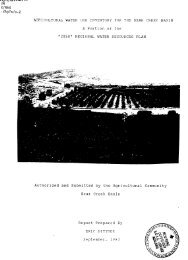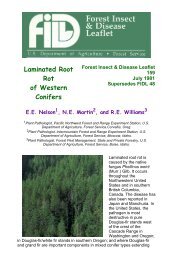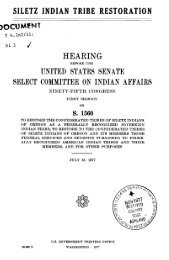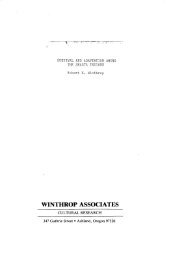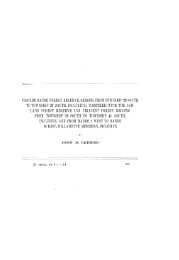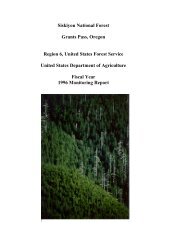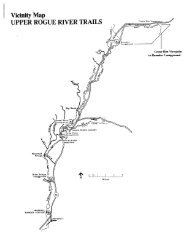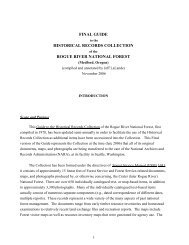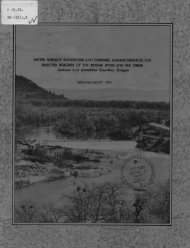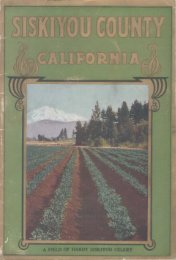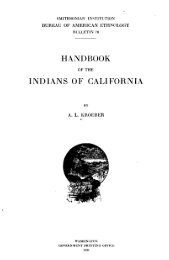- Page 1 and 2: "IT CAN'T HAPPEN HERE" IN OREGON: T
- Page 3 and 4: Copyright 1993 Jeffrey Max LaLande
- Page 5 and 6: v mobilize support and to effect po
- Page 7 and 8: vii AWARDS AND HONORS: Several Cert
- Page 9 and 10: ix Baril, John Billings, Todd Carne
- Page 11 and 12: xi TABLE OF CONTENTS Chapter Page I
- Page 13 and 14: xiii LIST OF FIGURES Figure Page 1.
- Page 15 and 16: observer of American politics, woul
- Page 17 and 18: 4 Dorothy Thompson, returned from h
- Page 19 and 20: 6 establishment. This insurgent cru
- Page 21 and 22: 8 CHAPTER II INSURGENT DECADE, 1890
- Page 23 and 24: 10 political primacy to Jackson Cou
- Page 25 and 26: 12 Jackson County on the Eve of the
- Page 27 and 28: 14 norm; wheat dominated the annual
- Page 29 and 30: 16 Democratic Times, dominated the
- Page 31 and 32: the railroad in 1887 was a potentia
- Page 33 and 34: caught in a web of mortgage debt, h
- Page 35 and 36: During the late 1880s and early 189
- Page 37 and 38: 24 January. Subsequent flooding bro
- Page 39 and 40: 26 Six "sub-alliances" or local cha
- Page 41 and 42: 28 rings." The Demands, admitting t
- Page 43: 30 Who were Jackson County's leadin
- Page 47 and 48: 34 local People's party activities
- Page 49 and 50: after wagon load" of expectant peop
- Page 51 and 52: 38 at Jacksonville will be exposed
- Page 53 and 54: 40 courthouse to a number of Populi
- Page 55 and 56: 42 limited and contradictory. When,
- Page 57 and 58: 44 rates for most county positions.
- Page 59 and 60: 46 Populism in 1894. Not obtaining
- Page 61 and 62: 48 Association, a national anti-Cat
- Page 63 and 64: 50 With the Regular Populists field
- Page 65 and 66: 52 volatile situation that reached
- Page 67 and 68: dependence on wheat cultivation beg
- Page 69 and 70: 56 years later. Boasting sixteen fr
- Page 71 and 72: 58 By 1915, Jackson County exhibite
- Page 73 and 74: 60 led to a sudden drop in values.
- Page 75 and 76: 62 competing political groups, and
- Page 77 and 78: 64 Jackson County voters focused on
- Page 79 and 80: 66 added strength to anti-alcohol f
- Page 81 and 82: 68 history professor Joseph Schafer
- Page 83 and 84: 70 Coming from the pen of a close o
- Page 85 and 86: civil servants--burgeoned in Medfor
- Page 87 and 88: 74 inducted at the first meeting.29
- Page 89 and 90: 76 the stage was set for a rigorous
- Page 91 and 92: 78 Although rarely mentioned in the
- Page 93 and 94: 80 The county experienced further n
- Page 95 and 96:
82 the ultra-mountain [sic] element
- Page 97 and 98:
84 Phipps, Evan Reames, and E. E. K
- Page 99 and 100:
86 The I.A.V.L. lost badly to the "
- Page 101 and 102:
88 venerable courthouse.50 Assistan
- Page 103 and 104:
90 After attempting to boost declin
- Page 105 and 106:
Workers of the World, had drifted i
- Page 107 and 108:
94 CHAPTER IV THE DEPRESSION AND NE
- Page 109 and 110:
96 a "good trip... [in the] aeropla
- Page 111 and 112:
98 wrote to her prospective daughte
- Page 113 and 114:
100 Valley orchardists faced a simi
- Page 115 and 116:
102 Jackson County's long-time repr
- Page 117 and 118:
104 mid-July of 1931, the Medford P
- Page 119 and 120:
106 newspaperman when beginning the
- Page 121 and 122:
108 mired in other debts, signed hi
- Page 123 and 124:
ecalled, "He was a good fellow, we
- Page 125 and 126:
112 farmers' marketing cooperatives
- Page 127 and 128:
It is probable that, as a young sal
- Page 129 and 130:
116 Like many commentators during t
- Page 131 and 132:
our free America, in defense of our
- Page 133 and 134:
120 had hurled at Medford elite sin
- Page 135 and 136:
122 way of Llewellyn Banks' flare a
- Page 137 and 138:
124 rampant corruption, Fehl often
- Page 139 and 140:
sponsorship of "parity" (in the for
- Page 141 and 142:
128 Earl Fehl very nearly won the r
- Page 143 and 144:
130 warning of a Bar Association co
- Page 145 and 146:
132 financially by 1931. He inflate
- Page 147 and 148:
134 courthouse's formal dedication
- Page 149 and 150:
13 6 green and orchard blooms color
- Page 151 and 152:
up in [the penitentiary at] Salem i
- Page 153 and 154:
140 Robert Ruhl, alarmed by the res
- Page 155 and 156:
142 Although Ruhl feared Jackson Co
- Page 157 and 158:
144 and the editor would soon becom
- Page 159 and 160:
146 advantage from the crowded fiel
- Page 161 and 162:
148 To the Trenches: Courthouse Sta
- Page 163 and 164:
150 receiving wages. Banks occasion
- Page 165 and 166:
152 night during the height of the
- Page 167 and 168:
154 records," which new Sheriff Sch
- Page 169 and 170:
156 reportedly shouted "hang them..
- Page 171 and 172:
158 4,000 for Jennings belied the g
- Page 173 and 174:
160 of our great Democracy." 4 1 A
- Page 175 and 176:
huge cannery, and state-run banks p
- Page 177 and 178:
164 them let me alone and stand bac
- Page 179 and 180:
166 CHAPTER VI MEN AND WOMEN OF THE
- Page 181 and 182:
168 "A Bunch of Bolsheviks and Hill
- Page 183 and 184:
170 only if one considers old Popul
- Page 185 and 186:
172 and of the Ashland Gang, becaus
- Page 187 and 188:
174 with anti-G.G.C. associations)
- Page 189 and 190:
176 lumberman) tallied at 7 percent
- Page 191 and 192:
178 astonishment) the fact that one
- Page 193 and 194:
180 the... County Gang which has co
- Page 195 and 196:
182 mid-January. When they challeng
- Page 197 and 198:
184 "which brought a great many peo
- Page 199 and 200:
186 dominated intermediate-zone's "
- Page 201 and 202:
188 L. M. Sweet lived in the area o
- Page 203 and 204:
190 George Obenchain resided on a s
- Page 205 and 206:
192 uncertain. The couple lived bri
- Page 207 and 208:
194 hinterland participated openly,
- Page 209 and 210:
196 CHAPTER VII "I WILL TAKE THE FI
- Page 211 and 212:
198 loyalty of followers. Banks pra
- Page 213 and 214:
200 extralegal measures as necessar
- Page 215 and 216:
amount of trips made back and forth
- Page 217 and 218:
204 ballots. 14 The February 20 Goo
- Page 219 and 220:
"hauling away those damn ballots so
- Page 221 and 222:
without any word of support from hi
- Page 223 and 224:
210 themselves visibly at the jail.
- Page 225 and 226:
212 Chicago Mayor Anton Cermak, sta
- Page 227 and 228:
214 the publisher with additional w
- Page 229 and 230:
216 Prescott expressed to O'Brien h
- Page 231 and 232:
218 and another to the head of the
- Page 233 and 234:
220 teargas assault of the house wh
- Page 235 and 236:
investigation of the Jackson County
- Page 237 and 238:
224 experienced a "stormy career,"
- Page 239 and 240:
226 Oregonian blamed Llewellyn Bank
- Page 241 and 242:
228 Dave Gould of Medford, complain
- Page 243 and 244:
230 man," told Ruhl that he was "fo
- Page 245 and 246:
232 character witness against realt
- Page 247 and 248:
encouragement and, on Good Friday,
- Page 249 and 250:
236 the Banks trial, was a veteran
- Page 251 and 252:
poor, and opened windows meant that
- Page 253 and 254:
witness to the morning of March 16
- Page 255 and 256:
242 conduct"; Martin's horsewhip wa
- Page 257 and 258:
244 are lying!" at one pro-G.G.C. d
- Page 259 and 260:
246 other participants penalties ra
- Page 261 and 262:
248 freely." The Johnston family, w
- Page 263 and 264:
250 possibly Victor Birdseye." 5 1
- Page 265 and 266:
252 received word about the content
- Page 267 and 268:
254 into factions, shared a consens
- Page 269 and 270:
256 in southern Oregon with the Tri
- Page 271 and 272:
the contrary, the Pulitzer jury reg
- Page 273 and 274:
localistic pique that the often inf
- Page 275 and 276:
262 Rebellion. Ruhl chastised his c
- Page 277 and 278:
264 CHAPTER IX THE NEW DEAL AND AFT
- Page 279 and 280:
and secured government loans for th
- Page 281 and 282:
268 First as Tragedy, And Then as F
- Page 283 and 284:
agricultural policies, Banks asked
- Page 285 and 286:
272 forever. 18 Meier indicated som
- Page 287 and 288:
274 Pomeroy's pardon effort evident
- Page 289 and 290:
During 1935, Banks attracted furthe
- Page 291 and 292:
Pomeroy remained Banks' steadfast l
- Page 293 and 294:
attorney's office of forcing perjur
- Page 295 and 296:
282 wrote to his parole officer in
- Page 297 and 298:
consistently unsuccessful legal pro
- Page 299 and 300:
286 anger among many of the region'
- Page 301 and 302:
288 missed beating Roosevelt by onl
- Page 303 and 304:
free herself from its deadly coils"
- Page 305 and 306:
292 CHAPTER X "IT CAN'T HAPPEN HERE
- Page 307 and 308:
The core concept underlying the cat
- Page 309 and 310:
296 Fascism, Populism, and Demagogy
- Page 311 and 312:
298 contemporary American figures,
- Page 313 and 314:
300 like an old People's party man,
- Page 315 and 316:
302 intimidation. Banks sincerely e
- Page 317 and 318:
304 disturbances in places such as
- Page 319 and 320:
306 defense of local community and
- Page 321 and 322:
308 citizens, a powerful anti-elite
- Page 323 and 324:
310 to the Populist crusade. Willia
- Page 325 and 326:
312 People's party clubs, building
- Page 327 and 328:
314 spanned by a few bridges betwee
- Page 329 and 330:
316 example, historian Robert Dykst
- Page 331 and 332:
318 of the Jackson County Insurgenc
- Page 333 and 334:
320 the authoritarian theme should
- Page 335 and 336:
322 EPILOGUE Following the defeat o
- Page 337 and 338:
324 commissioner, who had been one
- Page 339 and 340:
326 variety of officials, from scho
- Page 341 and 342:
328 orchardist's son interviewed in
- Page 343 and 344:
330 Rogue River National Forest. Hi
- Page 345 and 346:
332 Secondary Sources: Books. Artic
- Page 347 and 348:
334 . The Populist Moment: A Short
- Page 349 and 350:
Lowitt, Richard. The New Deal and t
- Page 351 and 352:
Schorer, Mark. Sinclair Lewis: An A
- Page 353 and 354:
340 Clark, Malcolm, Jr. "The Bigot




